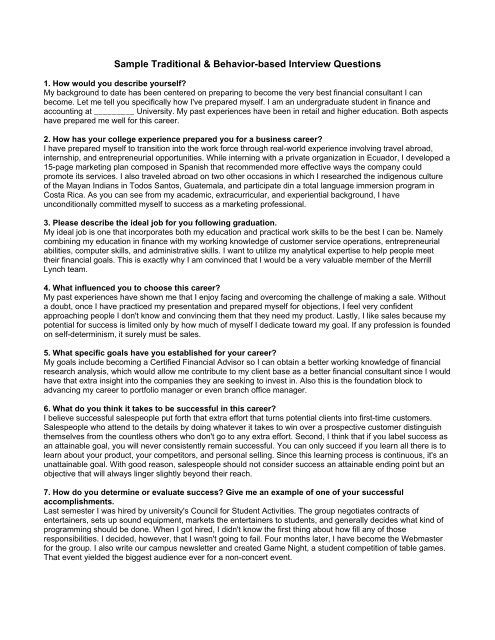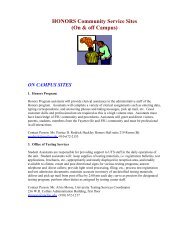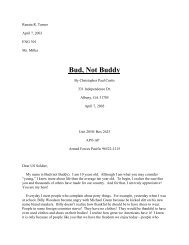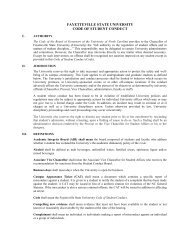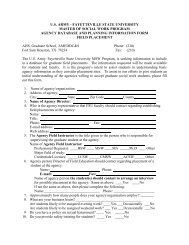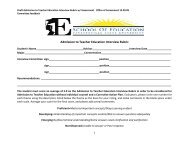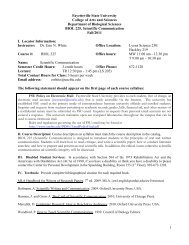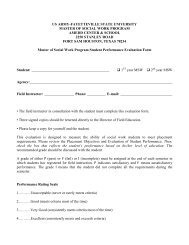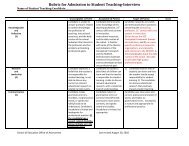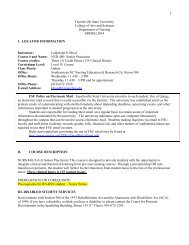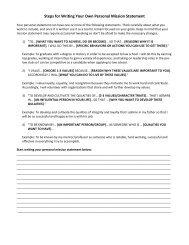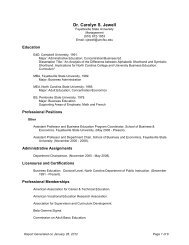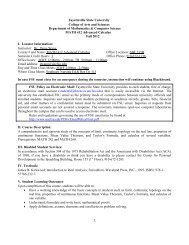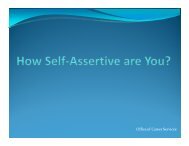Interview Questions - Fayetteville State University
Interview Questions - Fayetteville State University
Interview Questions - Fayetteville State University
Create successful ePaper yourself
Turn your PDF publications into a flip-book with our unique Google optimized e-Paper software.
Sample Traditional & Behavior-based <strong>Interview</strong> <strong>Questions</strong><br />
1. How would you describe yourself?<br />
My background to date has been centered on preparing to become the very best financial consultant I can<br />
become. Let me tell you specifically how I've prepared myself. I am an undergraduate student in finance and<br />
accounting at _________ <strong>University</strong>. My past experiences have been in retail and higher education. Both aspects<br />
have prepared me well for this career.<br />
2. How has your college experience prepared you for a business career?<br />
I have prepared myself to transition into the work force through real-world experience involving travel abroad,<br />
internship, and entrepreneurial opportunities. While interning with a private organization in Ecuador, I developed a<br />
15-page marketing plan composed in Spanish that recommended more effective ways the company could<br />
promote its services. I also traveled abroad on two other occasions in which I researched the indigenous culture<br />
of the Mayan Indians in Todos Santos, Guatemala, and participate din a total language immersion program in<br />
Costa Rica. As you can see from my academic, extracurricular, and experiential background, I have<br />
unconditionally committed myself to success as a marketing professional.<br />
3. Please describe the ideal job for you following graduation.<br />
My ideal job is one that incorporates both my education and practical work skills to be the best I can be. Namely<br />
combining my education in finance with my working knowledge of customer service operations, entrepreneurial<br />
abilities, computer skills, and administrative skills. I want to utilize my analytical expertise to help people meet<br />
their financial goals. This is exactly why I am convinced that I would be a very valuable member of the Merrill<br />
Lynch team.<br />
4. What influenced you to choose this career?<br />
My past experiences have shown me that I enjoy facing and overcoming the challenge of making a sale. Without<br />
a doubt, once I have practiced my presentation and prepared myself for objections, I feel very confident<br />
approaching people I don't know and convincing them that they need my product. Lastly, I like sales because my<br />
potential for success is limited only by how much of myself I dedicate toward my goal. If any profession is founded<br />
on self-determinism, it surely must be sales.<br />
5. What specific goals have you established for your career?<br />
My goals include becoming a Certified Financial Advisor so I can obtain a better working knowledge of financial<br />
research analysis, which would allow me contribute to my client base as a better financial consultant since I would<br />
have that extra insight into the companies they are seeking to invest in. Also this is the foundation block to<br />
advancing my career to portfolio manager or even branch office manager.<br />
6. What do you think it takes to be successful in this career?<br />
I believe successful salespeople put forth that extra effort that turns potential clients into first-time customers.<br />
Salespeople who attend to the details by doing whatever it takes to win over a prospective customer distinguish<br />
themselves from the countless others who don't go to any extra effort. Second, I think that if you label success as<br />
an attainable goal, you will never consistently remain successful. You can only succeed if you learn all there is to<br />
learn about your product, your competitors, and personal selling. Since this learning process is continuous, it's an<br />
unattainable goal. With good reason, salespeople should not consider success an attainable ending point but an<br />
objective that will always linger slightly beyond their reach.<br />
7. How do you determine or evaluate success? Give me an example of one of your successful<br />
accomplishments.<br />
Last semester I was hired by university's Council for Student Activities. The group negotiates contracts of<br />
entertainers, sets up sound equipment, markets the entertainers to students, and generally decides what kind of<br />
programming should be done. When I got hired, I didn't know the first thing about how fill any of those<br />
responsibilities. I decided, however, that I wasn't going to fail. Four months later, I have become the Webmaster<br />
for the group. I also write our campus newsletter and created Game Night, a student competition of table games.<br />
That event yielded the biggest audience ever for a non-concert event.
8. Do you have the qualifications and personal characteristics necessary for success in your chosen<br />
career?<br />
I believe I have a combination of qualities to be successful in this career. First, I have a strong interest, backed by<br />
a solid, well-rounded, state-of-the-art education, especially in a career that is technically oriented. This basic<br />
ingredient, backed by love of learning, problem-solving skills, well-rounded interests, determination to succeed<br />
and excel, strong communication skills, and the ability to work hard, are the most important qualities that will help<br />
me succeed in this career. To succeed, you also need a natural curiosity about how systems work -- the kind of<br />
curiosity I demonstrated when I upgraded my two computers recently. Technology is constantly changing, so you<br />
must a fast learner just to keep up or you will be overwhelmed. All of these traits combine to create a solid team<br />
member in the ever-changing field of information systems. I am convinced that I possess these characteristics<br />
and am ready to be a successful team member for your firm.<br />
9. What has been your most rewarding accomplishment?<br />
A recent satisfying accomplishment is being sent to one of our branch banks that was notorious for not growing<br />
their loan base. The branch had logged $75,000 in new loans in an 18-month period prior to my arrival. Having a<br />
reputation as a "hired gun" when it came to loan production I was successful in the solicitation and booking of<br />
$700,000 in my first six months at the branch.<br />
10. How would you describe yourself in terms of your ability to work as a member of a team?<br />
I have had many opportunities in both athletics and academics to develop my skills as a team player. My tenure<br />
as a rower with my college's crew team serves as a good example. I learned a great deal about teamwork while<br />
rowing because all the rowers in the boat must act as one, which meant that we incessantly worked to keep each<br />
movement in the boat synchronized. On an individual basis, we still worked toward group goals through<br />
weightlifting and land-rowing. My experience as a marketing research team leader also helped me to learn the<br />
role of "team player." I viewed my position as that of group leader and of group member. I ensured that everyone<br />
in the group had equal opportunity to contribute, maintained excellent communication among group members,<br />
and coordinated their energies toward reaching our team's goal.<br />
11. Given the investment our company will make in hiring and training you, can you give us a reason to<br />
hire you?<br />
I sincerely believe that I'm the best person for the job. I realize that there are many other college students who<br />
have the ability to do this job. I also have that ability. But I also bring an additional quality that makes me the very<br />
best person for the job -- my attitude for excellence. Not just giving lip service to excellence, but putting every part<br />
of myself into achieving it. In college and at my previous jobs, I have consistently reached for becoming the very<br />
best I can become. I think my leadership awards from my college, and my management positions are the result of<br />
possessing the qualities you're looking for in an employee.<br />
12. Would you describe yourself as goal-driven?<br />
Yes, and I demonstrated my goal orientation as president of the local Jaycees, a community service organization.<br />
I am very proud of the fact that I set a goal of signing 50 new members by the end of the year, and I accomplished<br />
that.<br />
13. Describe what you've accomplished toward reaching a recent goal for yourself.<br />
My first few years in banking had me on the fast track to branch management. I realized at some point along the<br />
way that my true passion was in offering financial advice not limited to checking accounts and loans. It was at that<br />
point that I made the necessary arrangements to go back to school full-time to pursue my goal, which I am just<br />
about to achieve.<br />
14. What short-term goals and objectives have you established for yourself?<br />
My short-term objectives are to graduate from the Professional Development Program before the standard two<br />
years and begin developing a clientele. As an intern, I prepared ahead of time by studying for the Series 7 and<br />
Series 64 exams that constitute a majority of a beginning financial consultant's time. I'd like to make the company<br />
that hires me wonder what it ever did without me.<br />
15. Can you describe your long-range goals and objectives?
My primary objectives are to learn as much as possible about your company's product offering, organizational<br />
structure, and professional sales techniques so that I may become the most productive member of your sales<br />
team.<br />
16. What do you expect to be doing in five years?<br />
Although it is hard to predict the future, I sincerely believe that I will become a very good financial consultant. I<br />
believe that my abilities will allow me to excel to the point that I can seek other opportunities as a portfolio<br />
manager (the next step) and possibly even higher. My ultimate goal continues to be -- and will always be -- to be<br />
the best at whatever level I am working at within Merrill Lynch's corporate structure.<br />
17. What do you see yourself doing in ten years?<br />
Ten years from now I see myself as a successful consultant for a world-class firm like yours. I want to have<br />
developed a wonderful bond with my employer I will have proven myself a highly competent systems analyst and<br />
will represent my company in helping others find solutions to their information-systems needs in a professional<br />
and timely manner.<br />
18. How would you evaluate your ability to deal with conflict?<br />
I believe I am quite good at handling conflict. Working in retail and in the residence halls required that I make<br />
many unpopular decisions at times, whether it was terminating an associate or taking judicial action on a resident.<br />
Often the person in conflict with me would be upset and sometimes physically outraged. I would always make<br />
sure that I fully explained the situation, the policies behind my decision, and why those policies exist. Usually by<br />
the end of the conversation, the person could see the other side of the situation.<br />
19. Have you ever had difficulty with a supervisor or instructor? How did you resolve the conflict?<br />
Yes, I had an incident with my Spanish professor. I turned in an essay that she said was too good to be mine. I<br />
was honest with her; I told her that I had a native speaker review the essay, but he made very few corrections.<br />
However, I had broken the Golden Rule of Spanish Composition -- the essay must not even touch the hands of a<br />
native speaker. To prove to her that I was capable of producing an essay that exceeded her expectations of a<br />
non-native speaker, I offered to re-write another essay in her office. I earned an A-minus.<br />
20. Tell me about a major problem you recently handled. Were you successful in resolving it?<br />
While working at K-mart, I was one of three people to work in the electronics department. One day upon arriving<br />
at work, I was told the district manager was coming the next day to do a store inspection. The two other people<br />
who worked in electronics were both over 55. Neither could lift heavy objects, and one refused to work at all. As a<br />
result, the electronics department was usually left to me to keep stocked with product and kept in order. I had<br />
about five hours of work time to get the entire department in order. Those five hours passed around, and there<br />
was still a substantial amount of work to be done. I asked the store manager if I could stay and work after hours<br />
while the overnight stockers were there. He said that because of the employment budget, he could not let me. I<br />
was faced with bringing the entire store's rating down, so I suggested a creative staffing solution, allowing me to<br />
work the extra hours while temporarily reducing the hours of the other two members of the department. Because<br />
of this solution, in a matter of hours, the department was in tip-top shape -- and still under budget. And the<br />
results? The electronics department got a score of 95 out of 100.<br />
21. Would you say that you can easily deal with high-pressure situations?<br />
Yes. My past experience as an Administrative Coordinator required me to deal with many serious situations since<br />
I held emergency on-call duties as a supervisor. One example was when I was called by a Resident Assistant to<br />
deal with an attempted suicide on her residence hall floor. The situation required that I think clearly and quickly in<br />
this life-and-death situation. I had to weigh the many tasks that needed to be completed. I had to assign RAs to<br />
call 911, make sure that EMS could get into the locked building, while at the same time applying first aid, and<br />
ensuring that the rest of the residents on the floor were OK. I also had to make sure the privacy of the resident in<br />
need was respected. I basically prioritized and dealt with each task by its importance. I delegated responsibility to<br />
RAs for things that they were capable of handling because I could not physically be in many places at once. Once<br />
the resident was taken to the hospital, I was responsible for paperwork and follow up to make sure the staff<br />
members, residents, and the resident-in-need adjusted back to "normal" life. I know this is an extreme example<br />
not found in the financial consulting field; however, it shows just how well I can deal with extreme pressure.
22. What quality or attribute do you feel will most contribute to your career success?<br />
My greatest strength is my flexibility. I have learned that work conditions change from day to day and throughout<br />
the day, as well, no matter where I have worked in the past. I also have realized that certain projects require<br />
individual attention and others involve a teamwork approach. These are just a few examples of the changes that<br />
happen in the financial consulting field, as you are well aware. My flexibility to adapt to the different demands of<br />
the job has allowed me to surpass my supervisor's expectations.<br />
23. What personal weakness has caused you the greatest difficulty in school or on the job?<br />
My greatest weakness had been delegation. I would take it upon myself to do many small projects throughout my<br />
shift as a manager that could have been done by others in an attempt to improve my workers' efficiency. Once I<br />
realized that I was doing more work than the other assistant managers, and they were achieving better results, I<br />
reevaluated what I was doing. I quickly realized that if I assigned each person just one small project at the<br />
beginning of their shift, clearly state expectations for the project, and then follow up that everything would get<br />
done, and I could manage much more efficiently and actually accomplish much more.<br />
24. What were your reasons for selecting your college or university?<br />
My college has always had a reputation as having an excellent accounting department, so I knew that if I enrolled<br />
there, I would achieve first-class preparation for my chosen career field. It is also a highly accredited school<br />
known for satisfying employers with the preparation of its graduates -- that's why companies like yours recruit at<br />
my school -- the school produces top graduates. The school offers an excellent liberal-arts background, which<br />
research shows equips graduates with numerous qualities, such as versatility and strong critical-thinking skills.<br />
Finally, having visited the campus before enrolling, I knew that the business school emphasized group projects.<br />
During my four years in the school, I participated in more than 35 group projects, which taught me invaluable<br />
teamwork, communication, and interpersonal skills.<br />
25. How will the academic program and coursework you've taken benefit your career?<br />
As you will note on my resume, I've taken not only the required core classes for the finance field, I've also gone<br />
above and beyond by double majoring in accounting. I doubled majored since I knew that the financial consulting<br />
field requires much knowledge of portfolio analysis and understanding of the tax laws. I believe that my success in<br />
both areas of study have specifically prepared me for this area. But it's not just taking the classes in these two<br />
areas that allow me to offer Merrill Lynch clients more. I minored in Spanish to understand the growing Hispanic<br />
clientele in the Central Florida area, which as you are well aware, is a growing source of revenue for the industry.<br />
If you like, I can elaborate on other aspects of my education further.<br />
26. Which college classes or subjects did you like best? Why?<br />
My favorite classes have been the ones pertaining to my major, which is marketing. These classes have laid the<br />
groundwork for my career in marketing. They have also taught me skills that I can bring to my employer, ranging<br />
from communication skills to interacting with others.<br />
27. Do you think that your grades are an indication of your academic achievement?<br />
I have focused much of my energy on work and obtaining real-world experience. I commend my classmates who<br />
have earned high GPAs, but I also feel it's important to be well-rounded. In addition to work experience, I<br />
participated in sports and extracurricular activities in school. These activities taught me leadership,<br />
communication, and teamwork skills. Sometimes my heavy load has not allowed me to keep up with some of my<br />
studies, but I have learned an enormous amount that I can apply in my future industry. As you will discover if you<br />
talk to my supervisors, my ability to work effectively is much more reflective of my future potential than is my GPA.<br />
28. What plans do you have for continued study; an advanced degree?<br />
I plan to continue my education for the rest of my life. In any technology-related field, keeping up to date through<br />
continuing education is of the utmost importance. Continuing education can include on-the-job training, courses<br />
sponsored by the employer, and courses taken in new technologies as they emerge. I plan to be not only a career<br />
employee but a career student so that I can be the best information systems analyst I can be. I will ensure,<br />
however, that any education I pursue not only doesn't interfere with my job or the company's policies, but will<br />
enhance my value as an employee.<br />
29. Describe the characteristics of a successful manager.
A successful manager should have the vision and capabilities to formulate strategies to reach his or her<br />
objectives and communicate these ideas to his or her team members. In addition to serving as a positive role<br />
model for co-workers, successful managers must also be capable of inspiring others to recognize, develop, and<br />
apply their talents to their utmost potential to reach a common goal. These are the traits I hope to demonstrate<br />
when I'm a manager.<br />
30. Why did you decide to seek a position in this company?<br />
I am convinced that there would be no better place to work than Accenture. You are the top consulting firm in the<br />
United <strong>State</strong>s. You provide your employees with the tools they need to stay competitive and sharpen their skills<br />
while working in an open, team-based environment. I am also aware that you provide a mentor for all new<br />
employees, and I would embrace any opportunity to work with a mentor and eventually become one myself.<br />
31. Do you have a geographic preference?<br />
Although I would prefer to stay in the Mid-Atlantic area, I would not rule out other possibilities.<br />
32. Why do you think you might like to live in the community in which our company is located?<br />
Just a few weeks ago, I had the opportunity to spend several days in your community, and I fell in love with it. I<br />
love the fact that you have a thriving riverfront. I'm impressed with the many cultural opportunities here -- opera,<br />
theater, art, and independent films. I've also already become a fan of the Saints and the other sports teams based<br />
here. I have conducted significant Internet research on this city, so I am quite comfortable with your location.<br />
33. Would it be a problem for you to relocate?<br />
I'm open to opportunities within the company; if those opportunities involve relocation, I would certainly consider it.<br />
34. To what extent would you be willing to travel for the job?<br />
I am more than willing to travel. I understand the importance of going above and beyond the call of duty to satisfy<br />
customer requests is sometimes required and that Merrill Lynch's customer focus belief means that travel is<br />
expected in some circumstances. I am willing to make this commitment to do whatever it takes to develop that<br />
long-term relationship with a small business or client. It is only through this relationship that loyalty can be<br />
maintained and financial gains and growth can occur for both the client and Merrill Lynch. It is my understanding<br />
from other financial consultants that I have interviewed at Merrill Lynch that this occurs maybe one or two times a<br />
month.<br />
35. Which is more important to you, the job itself or your salary?<br />
A salary commensurate with my experience and skills is important, but it's only one piece of the package. Many<br />
other elements go into making up a compensation package, but more importantly, it's critical to me to enjoy what<br />
I'm doing, fit into the corporate culture, and feel I'm making a genuine contribution.<br />
36. What level of compensation would it take to make you happy?<br />
I am not depending on money to make me happy. What makes me happy is having a satisfying job that provides<br />
challenge and new situations daily.<br />
37. Describe a situation in which you were able to use persuasion to successfully convince someone to<br />
see things your way?<br />
Recently my company asked for bids on a phone system for our new college campus. Two companies came in<br />
very close with their bids, and most of my department wanted to go with a vendor that we have used in the past.<br />
After I looked over the proposals, it was clear that this was the wrong decision. So, I talked individually with each<br />
member of our staff and was able to change their minds and get the best product that would save money and<br />
provide the highest quality.<br />
38. Give me a specific example of a time when you used good judgment and logic in solving a problem.<br />
I had a client come into the bank where I worked and request a $5,000 personal loan to "pay off some bills." In the<br />
customary review process, I determined that what was really needed was a $25,000 debt-consolidation loan.<br />
Rather than giving the customer a "quick-fix" to the problem, I logically solved the problem in a way that was in<br />
the best interest of both the bank and the client.
39. By providing examples, convince me that you can adapt to a wide variety of people, situations and<br />
environments.<br />
I've shown my ability to adapt by successfully working in several very different jobs. For example, I lived with a<br />
native family in Costa Rica. I worked as a nanny for a famous writer in Cape Cod. I was responsible for dealing<br />
with Drug Court participants. And I catered to elite country-club clientele. I did it all well and had no trouble<br />
adapting.<br />
40. Describe a time when you were faced with problems or stresses that tested your coping skills.<br />
Arriving at the language school I was attending in Costa Rica in the middle of the night with very minimal Spanishlanguage<br />
skills, I found my way to a very small town with no street addresses or names and found my temporary<br />
residence. I was scared, but I handled the situation very well, very calmly. In very stressful situations, I am always<br />
the one in the group to stay calm and focused. My friends, family, and professors have always said that I am an<br />
oasis of calm in a storm.<br />
41. Give an example of a time in which you had to be relatively quick in coming to a decision.<br />
This happens often in the IT industry, but one recent example was when we had a core backbone switch die. It<br />
died at the worst possible time -- during exams -- as they always seem to do, and I needed to get it back up and<br />
running quickly. I analyzed the logs and system status, and using my previous experience, made some quick<br />
decisions that rectified problem and got the equipment back up only minutes later.<br />
42. Describe a time when you had to use your written communication skills to get an important point<br />
across.<br />
As an Administrative Coordinator, I had a staff of 27 students. Having such a large student staff all working<br />
different shifts and having varying class schedules meant that meetings could not be held with everyone at one<br />
time. I needed to communicate with everyone about important policies and information often, so I came up with<br />
the idea of designing a Web page for my staff with written announcements. Each Desk Assistant was required to<br />
check the Web page daily at the beginning of his/her shift. I also sent email communications by a distribution list<br />
that allowed each Desk Assistant to keep informed about anything. The one situation that stands out in my mind<br />
is a last-minute summer camp that decided to come in a day early with only one day's notice. I had no staff<br />
scheduled to check in the camps or to organize the keys. I posted an update to the Web page and sent an email.<br />
Within four hours, I had the following day completely staffed and desk assistants there to organize room keys for<br />
the campers that night.


